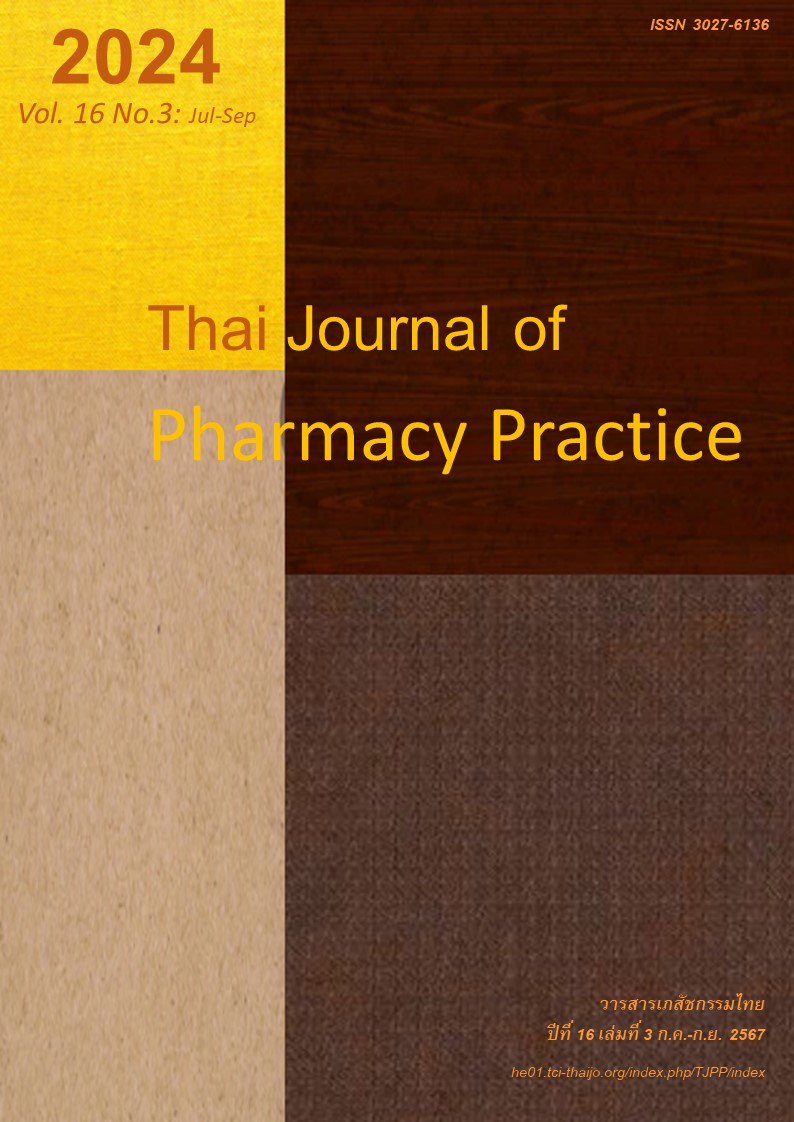Competency of Pharmacists in Drug System Management and the Practice of Thai Pharmacists
Main Article Content
Abstract
Objective: To study the relevance of competency of pharmacists in drug system management and the practice of Thai pharmacists. Methods: This cross-sectional descriptive study used online questionnaires to survey the opinions of pharmacists on pharmacy competencies in drug system management. The competency was developed from literature review with two rounds of examination for its content validity by 21 pharmacy experts using the modified Delphi technique. The competencies consisted of 3 domains including 1) general management with 5 competencies and 28 behavioral competencies, 2) drug system management with 3 competencies and 13 behavioral competencies, and 3) leadership and governance with 5 competencies and 17 behavioral competencies. Each competency consisted of behavioral competencies at entry level and advanced level. The questions on the level of relevancy of 58 behavioral competencies with the practice of pharmacists were on a 4-point Likert scale (ranging from very likely to least likely). Results: A total of 386 pharmacists completed the questionnaires, consisting of 254 hospital pharmacists (65.80%), 71 marketing pharmacists (19.17%), 33 community pharmacists (8.55%), 21 pharmacists in consumer protection (5.44%), and 7 manufacturing pharmacists (1.81%). Fifty-one behavioral competencies (87.93%) were relevant with the practice of pharmacists. There were 7 behavioral competencies that were irrelevant with the practice including those related to financial management, procurement and supply chain management and implementation of national health policies. Those who were more likely to rate them as irrelevant were pharmacists without management position and working in manufacturing sectors. Conclusion: The developed competency framework on drug system management was relevant with the practice of pharmacists in Thailand and could be used in pharmacy manpower development.
Article Details

This work is licensed under a Creative Commons Attribution-NonCommercial-NoDerivatives 4.0 International License.
ผลการวิจัยและความคิดเห็นที่ปรากฏในบทความถือเป็นความคิดเห็นและอยู่ในความรับผิดชอบของผู้นิพนธ์ มิใช่ความเห็นหรือความรับผิดชอบของกองบรรณาธิการ หรือคณะเภสัชศาสตร์ มหาวิทยาลัยสงขลานครินทร์ ทั้งนี้ไม่รวมความผิดพลาดอันเกิดจากการพิมพ์ บทความที่ได้รับการเผยแพร่โดยวารสารเภสัชกรรมไทยถือเป็นสิทธิ์ของวารสารฯ
References
Suttajit S, Suwannaprom P, Eakanunkul S. On account of manpower: pharmacy workforce in the complexity of healthcare system. Chiang Mai: Center for Community Drug System Research and Development, Faculty of Pharmacy, Chiang Mai University; 2018.
Suwannaprom P, Suttajit S, Eakanunkul S, Supapaan T, Kessomboon N, Udomaksorn K, Sakulbumrungsil R. Development of pharmacy competency framework for the changing demands of Thailand’s pharmaceutical and health services. Pharm Pract (Granada). 2020; 18: 2141. doi: 10.18549/Pharm Pract.2020.4.2141
Whiddett S, Hollyforde S. A practical guide to compe- tencies: how to enhance individual and organisa- tional performance. London: CIPD Publishing; 2003.
Udoh A, Bruno-Tomé A, Ernawati DK, Galbraith K, Bates I. The development, validity and applicability to practice of pharmacy-related competency frame- works: A systematic review. Res Social Admin Pharm. 2021; 17: 1697-718.
International Pharmaceutical Federation. FIP Global competency framework version 2 [online]. 2020 [cited Jul 27, 2021]. Available from: www.fip.org/ file/5127.
Pharmaceutical Society of Australia. National compe- tency standards framework for pharmacists in Australia [online]. 2016 [cited Nov 1, 2021]. Available from: www.psa.org.au/wp-content/uploads/2018/06 /National-Competency-Standards-Framework-for-Ph armacists-in-Australia-2016-PDF-2mb.pdf.
The Pharmaceutical Society of Ireland. Core compe tency framework for pharmacists [online]. 2013 [cited Nov 1, 2021]. Available from: www.thepsi.ie/Librarie s/Pharmacy_Practice/PSI_Core_Comp_Framework _Web_Version_Final.sflb.ashx.
Competency Development and Evaluation Group. A Framework for pharmacist development in general pharmacy practice [online]. 2007 [cited Nov 1, 2021]. Available from: www.codeg.org/fileadmin/codeg/pdf/ glf/GLF_October_2007_Edition.pdf.
Pharmacy Council of Thailand. Announcement of Pharmacy Council of Thailand No. 18/2012. Professional competency of 6-years Pharm D curriculum [online]. 2012 [cited Oct 26, 2021]. Available from: pharmacycouncil.org/share /file/file_ 265.pdf.
Pharmacy Council of Thailand. Announcement of Pharmacy Council of Thailand No. 8/2011. Professional competency of pharmaceutical care curriculum [online]. 2011 [cited Oct 26, 2021]. Available from: pharmacycouncil.org.
Pharmacy Council of Thailand. Announcement of Pharmacy Council of Thailand No. 6/2014. Professional competency of pharmaceutical science curriculum [online]. 2014 [cited Oct 26, 2021]. Available from: www.pharmacycouncil.org.
Pharmacy Council of Thailand. Announcement of Pharmacy Council of Thailand No. 20/2015. Professional competency of pharmaceutical consu- mer protection in public health curriculum [online]. 2015 [cited Oct 26, 2021]. Available from: pharma cycouncil.org/index.php?option=content_detail&view=detail&itemid= 670&catid=36.
DiPiro JT. Preparing for the next generation pharma cists. Pharm Pract (Granada). 2020; 18: 1988. doi: 10.18549/PharmPract.2020.2.1988.
American Society of Health-System Pharmacists. ASHP practice advancement initiative 2030: new recommendations for advancing pharmacy practice in health systems. Am J Health-Syst Pharm 2020; 7: 113-22.
Yamane T. Statistics: an introductory analysis. Singapore: Times Printer; 1973.
Srisuphan V, Suttajit S, Suwannaprom P, Plodpai P, Prapaso N, Anuratpanich L, et al. Pharmacy work force. In: Tantiviess S, Chamniandamrongkarn S, editors. Thai drug system. Nonthaburi: Health Systems Research Institute; 2021. p. 506-63.
Ministry of Public Health. Geographic information system for health resources [online]. 2021 [cited Aug 31, 2021]. Available from: gishealth.moph.go.th/healt hmap/gmap.php.
Eakanunkul S, Kaewboonsert C, Wongsampun N, Suwannaprom P. Knowledge and perceptions of hospital pharmacists towards biological products and biosimilar. Thai Journal of Pharmacy Practice 2015; 7: 60-72.
Japan Pharmaceutical Association. Japan Pharma ceutical Association lifelong learning support system [online]. 2012 [cited Oct 26, 2021]. Available from: www.nichiyaku.or.jp/action/wp-content/uploads/2012 /02/jpals_flyer.pdf.
Arakawa N, Yamamura S, Duggan C, Bates I. The development of a foundation-level pharmacy compe- tency framework: An analysis of country-level applicability of the global competency framework. Res Social Admin Pharm 2020; 16: 396-404.
Bruno AF. The feasibility, development and valida- tion of a global competency framework for pharmacy education [dissertation]. London: University College London; 2011.
South African Pharmacy Council. Competency stan- dards for pharmacists in South Africa [online]. 2018 [cited Oct 26, 2021]. Available from: www.mm3 admin.co.za/documents/docmanager/0C43CA52-12 1E-4F58-B8F6-81F656F2FD17/00126360.pdf.
Suwannaprom P, Suttajit S, Plodpai P,Prapaso N, Sirsuphan V. Pharmacy workforce: a call for profes- sional cohesion to meet the rising healthcare demand. Journal of Health Science. 2020; 29: S141-152.


